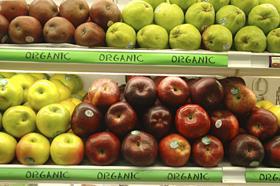
Exports of organic food to the EU could be prohibited for up to nine months in the event of a no-deal Brexit.
According to a government technical notice issued today (23 August), the UK will become a third country if no agreement is reached by 29 March 2019, meaning UK businesses would only be able to export to the EU if they were certified by an organic control body recognised and approved by the EU.
To achieve that recognition, UK control bodies would need to apply to the EC, but would not be able to do this until the UK has left the union. The process can take up to nine months, though the British government said it is exploring ways to speed up the process.
'As we are retaining EU regulation in UK law, we expect to negotiate an equivalency arrangement with the EU which will allow the free movement of organic goods between the EU and the UK,' Defra said.
Current EU legislation around organic food is expected to be rolled into UK law, with no plans to introduce major policy changes. However, anew UK-owned imports traceability system would replace the current EU TRACES NT system to ensure the traceability of organic food and feed. Defra has promised to release more information on the new system in the coming weeks.
Elsewhere, logos on organic packging would need to change, as UK suppliers and retailers would no longer be allowed to use the EU organic logo, with a grace period to use up existing stock.Defrarevealed it has commissioned research on organic logos used worldwide, which will provide evidence for developing any future UK logo.
Despite the first clear pronouncements on what could happen to organic food post-Brexit, the Soil Association's head of standards, Chris Atkinson, said the technical notice provided 'no further clarity' to businesses nor any helpful advice in how to prepare.
“The information outlined raises concerns that imports and exports to and from the EU may be held up for months,' he added. 'The critical issue of continuing recognition by the EU of the organic status of products certified in the UK is left entirely unresolved by this paper and asimilar documentthat was issued by the EU some months ago. We are also concerned that a new UK-owned imports traceability system to replace the current EU system would need to be in place by 29 March 2019. In our view this is an unrealistic goal within the time frame. Delays could significantly hinder trade.'



